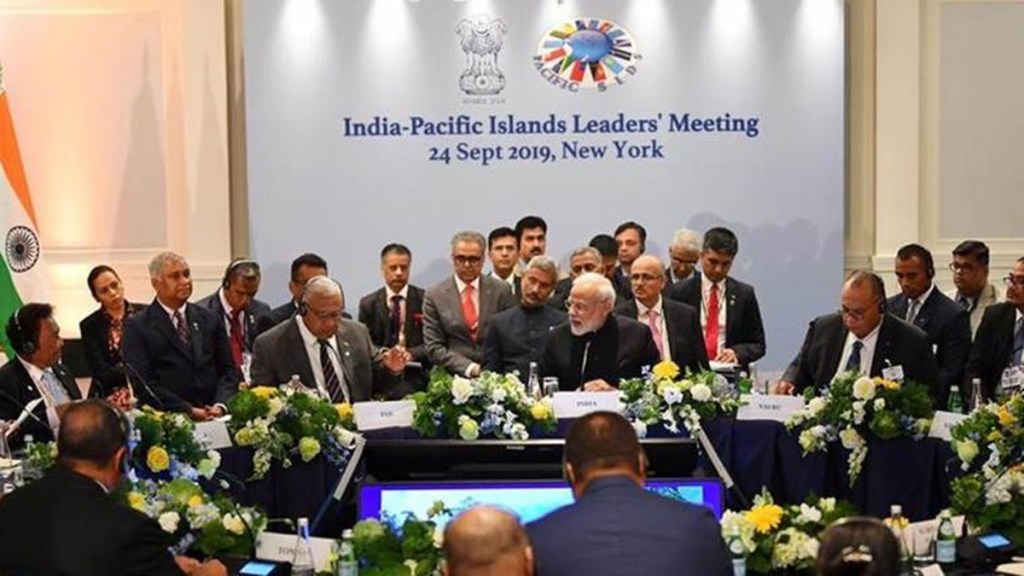Next week Prime Minister Narendra Modi during his visit to Papua New Guinea (PNG) and his counterpart Prime Minister James Marape will jointly host the third summit of the Forum for India-Pacific Islands Cooperation (FIPIC). The focus during the meeting is expected to be on maritime cooperation, blue economy, trade and renewable energy.
Why are these Pacific Island Countries important for India?
Engagement with these 14 countries is part of India’s Act East Policy and India has been engaging with these countries mainly through development assistance under South-South Cooperation. Financial Express Online has reported earlier that India has been extending assistance in the form of capacity building, training, grants-in-aid, loan assistance and community development projects.
Also read: PM Modi set to travel to Australia as scheduled though QUAD summit is cancelled next week
Under the rubric of Act East Policy, India has launched the Forum for India-Pacific Islands Cooperation (FIPIC) and the first meeting of this forum was hosted by Prime Minister Narendra Modi in Fiji in 2014 and all the 14 countries participated.
The second meeting of the forum took place in Jaipur back in 2015 where all the 14 countries participated. And initiatives across a wide range were announced for the development of the people.
In view of the rising importance of the Indo-Pacific regionally and internationally the PICs have attracted a lot of attention from countries like China, Japan, the US, Russia and others.
With its growing maritime domain awareness, strategic ambitions and its growing economic interests in the Indo-Pacific region, India’s approach to the PICs has been changing gradually as it is looking beyond its immediate region.
Development Partnership
India has, according to officials, extended assistance for community projects like coral farms, solar electrification, boats and pick-up trucks, vehicles, construction of sea wall, supply of agricultural equipment, computers and LED bulbs for schools, sewing machines, dialysis machines, and portable saw mills.
Centres of Information Technology Labs and Centres for Excellence in IT (CEITs) have been established in different countries in PICs.
Due to the effects of rising sea levels these countries are vulnerable to climate change. And India has once again been at the forefront in extending initiatives including International Solar Alliance (ISA) and Coalition for Disaster Resilient Infrastructure (CDRI).
On the sidelines of the COP26 at Glasgow in November, India, Australia, the UK and Small Island Developing States (SIDS) under the CDRI framework. This is to assist the SIDS from disasters, and to help in mobilizing finances and technology and to provide necessary information to these countries as well as CARICOM nations in the Indo-Pacific Region.
Challenges of climate change threaten PICs and to deal with this, India has a project for providing solar electrification for 2,800 houses in 14 countries and has also undertaken 70 women solar engineers — Solar Mamas. These 70 women have been trained and the process of electrification is underway. This will not only address climate change and achieve the goals of sustainable development, it will also help to provide livelihoods to women.
Under Other Development Partnership, India is supporting infrastructure development, and the focus is especially on education, culture, health, renovation of colleges, IT infrastructure, and setting up of digital libraries, among others.
Fiji and PNG were supplied with indelible ink for use in their general elections.
Also read: Role of NCC in nation-building is crucial; major expansion plan nationwide: MoS Defence Ajay Bhatt
In the health sector around 600 Fijians were provided with customized prosthetic limbs in a Jaipur Foot Camp fully funded by the Indian government and organised in collaboration with the Fijian Ministry of Health and Medical Services.
From time to time India has been providing Humanitarian Assistance and Disaster Relief (HADR) and has also provided assistance during the pandemic when it supplied Covid-19 Vaccines and Medical supplies.
In 2017 India-UN Development Partnership Fund was created, aimed to support the demand-driven sustainable development projects not only in developing countries, LDCs and on small island developing states. In fact PICs have been beneficiaries of this fund.

